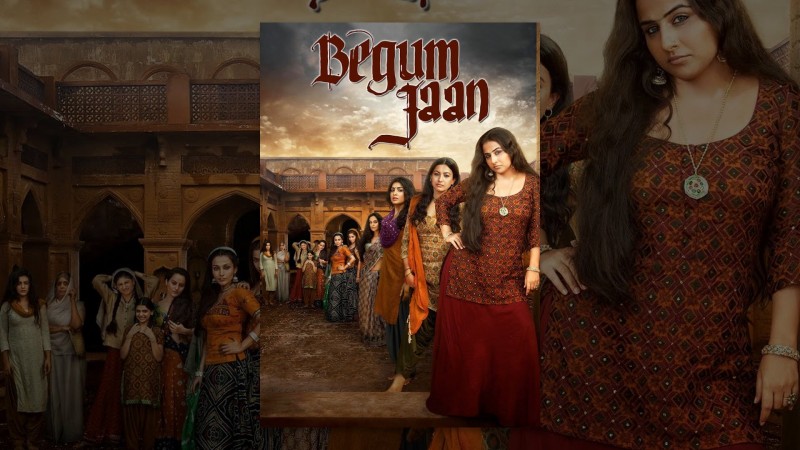
Storytelling in Indian cinema has a long history and has covered a wide range of subjects, feelings, and plots. In order to convey their authenticity and depth, these narratives occasionally call for the use of gritty dialogue and intense language. One such movie is "Begum Jaan," which was made with Vidya Balan playing the lead role and was directed by Srijit Mukherji. It audaciously investigates the sex workers' lives in a brothel during the 1947 division of India and Pakistan. The movie was able to obtain an A (Adults Only) certificate from the Indian censor board without any significant cuts, despite its controversial subject matter and language. The makers were asked to replace some dialogues that contained profanity, so the road to this certification wasn't without its difficulties. In-depth analysis of the decision's significance and wider ramifications for freedom of expression and censorship in Indian cinema is provided in this article.
Since the beginning of Indian cinema, censorship has been a divisive subject. In order to ensure that films reflect Indian cultural and moral values, the Central Board of Film Certification (CBFC), also referred to as the censor board, is essential in controlling the content of films. The censor board and filmmakers have frequently disagreed over artistic freedom and creative expression, despite the fact that the intentions behind this regulation are frequently good.
"Begum Jaan," which is based on the 2016 Bengali film "Rajkahini," examines the terrifying experiences of a group of women in a brothel on the border between India and Pakistan during the partition. The story inevitably called for frank and impactful dialogue to capture the characters' harsh realities. However, such material frequently runs the risk of infringing on the censor board's rules.
"Begum Jaan" was able to obtain an A (Adults Only) certificate from the censor board despite its difficult subject matter and use of explicit language. This choice represented a significant victory for the movie's producers because it allowed them to tell their story honestly and without apology. While the A certificate limits audience to adults, it ensures that the film's artistic integrity is upheld and the gritty story is not watered down for a larger audience.
The use of profanity in the movie was one of the main issues the censor board addressed during the certification process. An issue that frequently comes up in discussions about censorship is profanity, or the use of offensive and vulgar language. Profanity was employed in "Begum Jaan" to reflect the harsh and merciless world in which the characters lived. It served as a tool to elicit sincere feelings and highlight the gravity of the circumstances they faced.
In order to maintain the film's integrity while still complying with certain censorship standards, it was decided to ask the creators to replace some dialogues that contained profanity. This compromise was a practical strategy that balanced the needs of the general public and artistic expression.
The conflict between artistic expression and censorship is not exclusive to "Begum Jaan." It is a recurring subject in Indian film history. Filmmakers frequently face the dilemma of deciding whether to give up their artistic vision in order to achieve a wider release or to stand their ground and run the risk of receiving cuts or being banned.
With regard to "Begum Jaan," the choice to award an A certificate without significant cuts marks a development in the understanding of the value of artistic freedom in film. It recognises that some stories need to be told in their most unfiltered, raw form in order for the audience to connect with them fully. It also serves to emphasise the need for filmmakers to use explicit material responsibly, making sure that it advances the story rather than serving a purely decorative purpose.
It is encouraging for the Indian film industry that "Begum Jaan" was certified without significant cuts. Without worrying excessively about censorship, it encourages filmmakers to take on risky and socially significant subjects. This action encourages diversity in storytelling and gives filmmakers the freedom to experiment with new ideas.
It also demonstrates how the censor board's viewpoint on films has changed over time. In the past, a number of films were subject to strict censorship, which led to significant cuts or even bans. The censor board's decision regarding "Begum Jaan" reveals a growing willingness on their part to communicate with producers and find a middle ground that protects the narrative's core while addressing concerns about explicit content.
"Begum Jaan" is a testament to the strength of narrative and creative expression in Indian film. Its ability to obtain an A certificate without significant cuts demonstrates how censorship is changing in the industry. Even though difficulties still exist, the decision sets a good example for future filmmakers who want to tackle difficult and gruelling subjects.
In the end, "Begum Jaan's" success in navigating the tricky landscape of censorship confirms the idea that films are a powerful medium for reflecting society's truths, no matter how harsh or uncomfortable they may be. The delicate balancing act between artistic expression and censorship will continue to be a crucial part of Indian cinema's development and relevance in the world of cinema as it moves forward.
From Schoolgirl to Silver Screen Sensation: Sharmila Tagore's Debut in 'Kashmir Ki Kali'